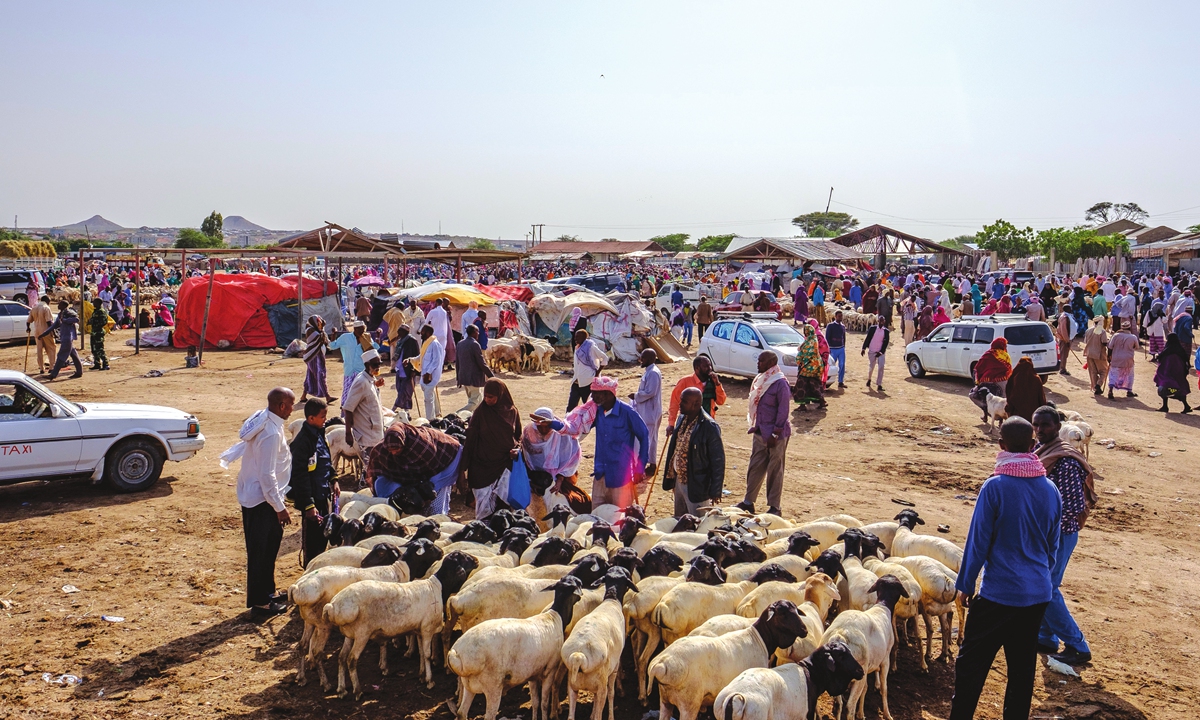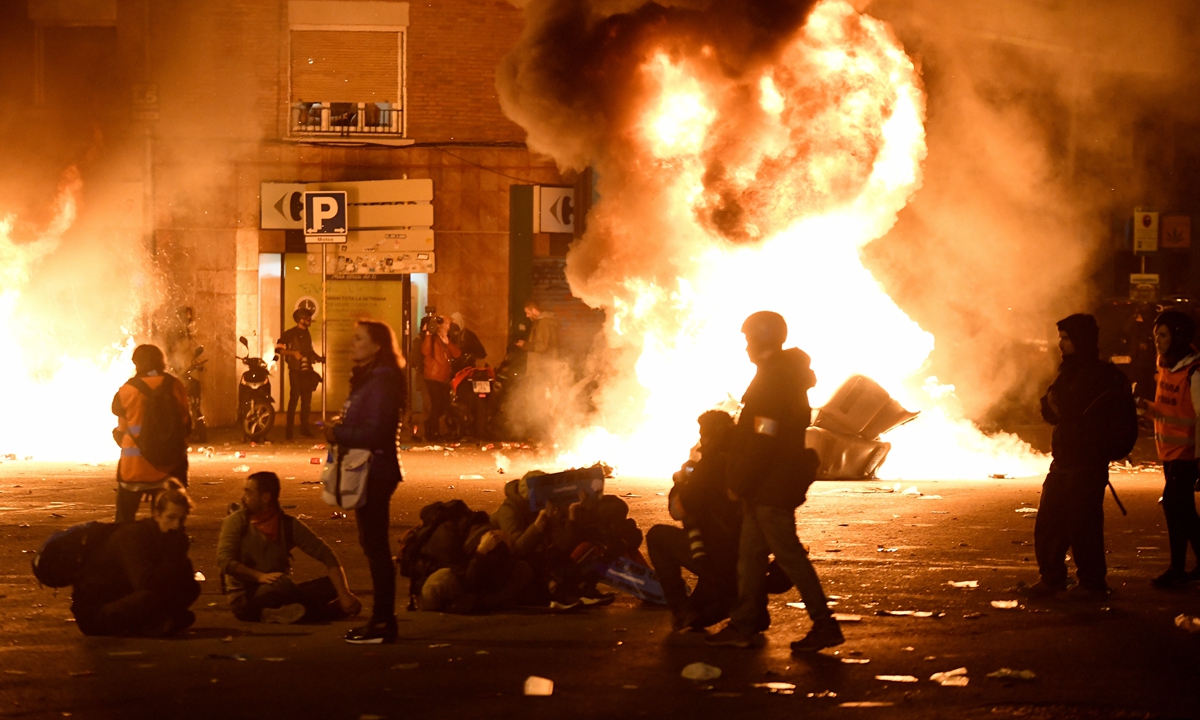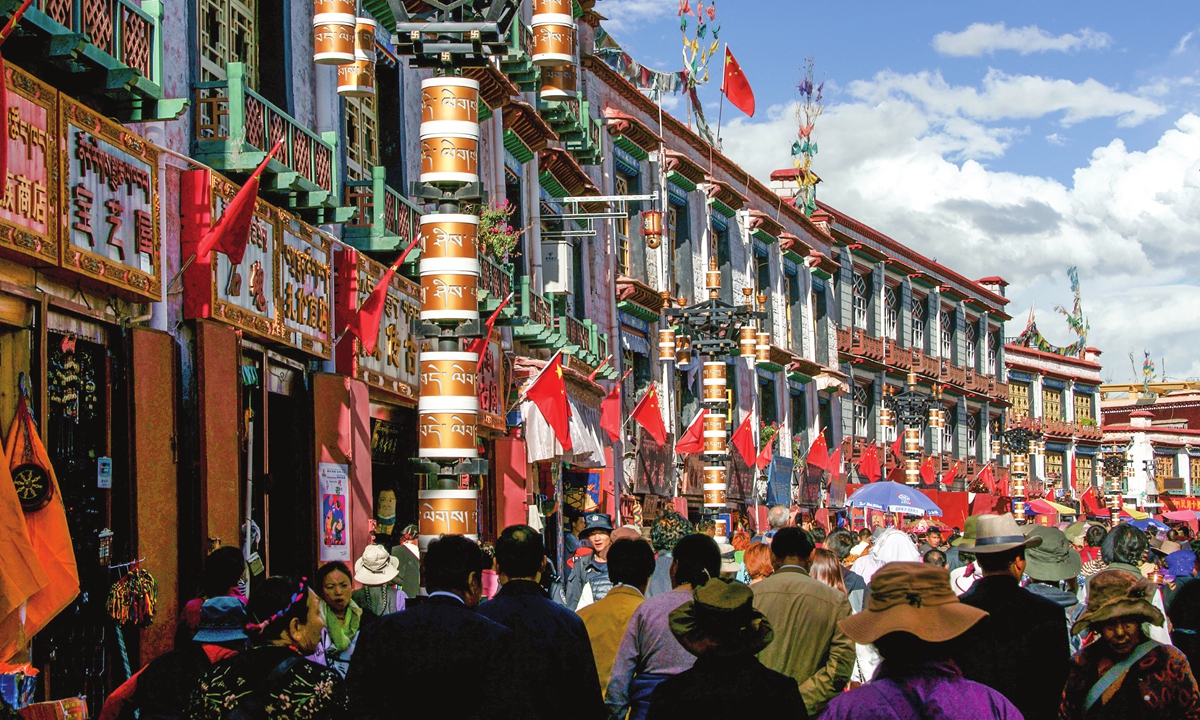UNPO decoded: organization serves as 'base camp' for secessionists around the globe
By GT staff reporters Source: Global Times Published: 2020/7/23 20:33:42

A view of Somaliland. Photo: IC
In early July, the island of Taiwan announced it will establish a representative office in Somaliland as a move to expand its "international space." Somaliland is a self-declared state from Somalia since 1991, which has not been recognized by any country internationally.
Taiwan and Somaliland are both members of the Unrepresented Nations and Peoples Organization (UNPO), which is actually a camp for separatists. China has been a target of the organization as UNPO keeps contact with separatists that attempt to divide Taiwan Island and Xinjiang Uygur Autonomous Region from China.
Different motives
Established in 1991 in The Hague, the Netherlands, the UNPO is not connected to the United Nations. It claims to be "an international membership-based organization established to empower the voices of unrepresented and marginalized peoples worldwide and to protect their fundamental human rights."
Most of its current 39 members are in Asia and Africa, such as Abkhazia (Northwestern Georgia), Ahvaz (Southwestern Iran), Balochistan (Southwestern Pakistan), Kabylia (Northern Algeria), East Turkestan, Catalonia of Spain, Brittany of France, and District of Columbia of the US.
In April, Nigeria's Biafra Independent Movement (BIM) joined UNPO under the promotion of its leader Ralph Uwazuruike. Nnamdi Kanu, leader of another organization called Indigenous People of Biafra, later commented Ralph Uwazuruike's decision cheapened BIM, and wasted the efforts all independence movements have made to win recognition from the UN.
Some analysts said the squabble is essentially a fight for leadership among the two organizations.

https://www.globaltimes.cn/content/1195480.shtml
When Nigeria won independence in 1960, the Igbo, an ethnic group in southeastern Nigeria, held many important posts in the federal government of Nigeria. Conflict soared after petroleum oil was found in Igbo neighborhoods. The Igbo people announced independence with the establishment of the Republic of Biafra in 1967. War broke out with the Nigeria federal government, and the federal government won.
Several decades after the war, there are still many Igbo people who say they have been treated unfairly, and keep fighting for their "independence."
Established in 2015, Indigenous People of Biafra has comparatively greater influence, and its leader Kanu resides in London, attempting to solicit support from overseas Igbo people and politicians in the US and UK. Kanu said BIM has raised attention from the UN and the African Union.
However, in August 2017, the Nigeria federal government launched a policy against the organization, and a month later, BIM was labeled as terrorist organization.
Catalonia joined the UNPO at the end of 2018 after the Spanish government refused to admit its independence. A representative of Catalonia told the Global Times the region has considered joining the UNPO since five or six years ago, but the plan was suspended for various reasons.
According to the representative, after joining in UNPO, the region could align itself with other separatis organizations to solicit attention from the international community as a vulnerable group.
Different from other organizations, the District of Columbia of the US is not aiming at independence, but gaining statehood. Many people in Washington, DC say they are taxed without representation because despite paying taxes, Washington, DC has no official representative in the senate, and has a non-voting seat in the House of Representatives.
According to the US Constitution, the District of Columbia's affairs should be deliberated and decided by the congress and implemented by the municipal government.
In June, the US House of Representatives passed a bill introduced by Democratic Party representatives to make the District of Columbia the 51st state of the US. But leading Republicans in Congress oppose the bill, saying the two new senate seats will fall in the Democratic Party once there is a new state.
Rumor camp
UNPO is headed by Ralph Bunche, who serves as general-secretary and runs two foundations in the US and the Netherlands. He is an American citizen and has been in office since 2018.
The members of UNPO include separatist groups within sovereign states that are not recognized by the international community.
They are mostly indigenous, ethnic minority groups and unrecognized "countries."
The history and status of each member is detailed on UNPO's website, but some of the content is disinformation.
UNPO's description of Southwest China's Tibet Autonomous Region uses what the "Tibetan Government in Exile" calls "the Greater Tibet Area" and declares that the Tibet Autonomous Region is not the real Tibet and that its jurisdiction was "artificially created by China in 1965 for political reasons."
This description omits the fact that since the Qing Dynasty set up its administration in Tibet in the early 18th century, the scope of the Tibet administrative region is basically the same as that of modern Tibet.
When UNPO introduces "East Turkistan," it accuses China of carrying out a strict fertility policy on Uygurs, which is untrue. In addition, the "Southern Mongolia" map used by UNPO is larger than the current area of North China's Inner Mongolia Autonomous Region.

Catalonian protesters stand around a burning barricade during the "El Clasico" Spanish League football match between Barcelona FC and Real Madrid CF in Barcelona on December 18, 2019. Photo: AFP
The Global Times found UNPO received little attention in Europe and the US, with the media only paying sporadic attention to controversial topics.
UNPO was first registered on October 3, 2011 as a "lobby group" on the EU website, with a registered capital of between 200,000 and 300,000 Euros (2018).
The group describes itself as an international membership organization. Joining UNPO does not mean that all the inhabitants or ethnic groups in the areas concerned are separatist. Only some of them formed groups fighting for "independence" and then joined UNPO.
There are also some organizations that have joined UNPO. Indigenous American groups like the Lakota nation and the Canadian Nuxalk (Bella Coola) joined not for independence, but for more rights of self-government. This is in sharp contrast to Chechen and "Xinjiang independence."
UNPO a strategic tool of the US to contain China with attempts to split Xinjiang, Tibet
UNPO was founded at the end of the Cold War when separatist movements sprang up around the world but now it has become a means of the US to apply its geopolitical strategists, as well as to tackle China.
According to William Engdahl, an American geopolitical scientist, in his book Armageddon: The Secret Agenda of Washington's New Cold War, UNPO was a dream organization for American geopolitical strategists. It was founded amid the fall of the Soviet Union, a year when much of Eurasia was in political and economic turmoil.
UNPO was first organized by "Xinjiang independence" secessionist Erkin Alptekin and the 14th Dalai Lama. Among the members of UNPO, there are "Taiwan independence," "Tibet independence," "Inner Mongolia independence," and "Xinjiang independence" secessionist forces concerning China.
Erkin was working for Radio Free Europe in the US when UNPO was founded, and that year he founded the secessionist organization "World Uyghur Congress."(WUC)
UNPO is hostile to China, especially over Xinjiang. In April 2008, the National Endowment for Democracy, funded by the US Congress, and UNPO organized a leadership workshop for WUC. In May 2009, UNPO co-hosted with NED the so-called Human Rights Conference on the theme "East Turkestan." In 2013, UNPO and the European Parliament jointly organized a seminar to call the world's attention to the so-called Uygur issue.

Street view of Lhasa, Southwest China's Tibet Autonomous Region Photo: VCG
In response to the opening of "representative offices" between the island of Taiwan and Somaliland, the Democratic Progressive Party (DPP) said it was "expanding its presence in Africa." However, an article in Taiwan News suggested the move was also a risk that could undermine the island of Taiwan's efforts to promote international recognition.
Many people in Taiwan Island have never heard of Somaliland, whose independence is not recognized by any country or international organization. Establishing ties with such an entity in fact creates a dangerous precedent and makes Taiwan's long-cherished goal of closer ties with the West seem distant, the news read.
UNPO announced to hold a conference from July 31 to August 2 at the end of June in Washington DC, which is expected to be held online because of the pandemic.
The conference is also a preparation for UNPO's 30th anniversary next year. It said it would set up a working group to study how the foreign and investment policies of China, Russia, the US and the EU affect the rights of the world's "unrepresented" population.
Sources close to UNPO members told the Global Times the organization receives most of its funding from its members, donations from Western foundations, some of which have joined in order to gain more international support. "Western countries are reluctant to donate to separatist groups because they are worried about them," the source said.
An anonymous international politics expert from Hamburg, Germany, told the Global Times the official goal of UNPO is to support the "Five Principles" of fair self-determination and internationally recognized human rights standards. "However, UNPO members are actually secessionists," he said.
The expert said Western governments and institutions are not as "enthusiastic" about some radical separatist groups as they once were, because they are already struggling with internal turmoil, the rise of the far-right, increased terrorism and an economic downturn at home.
RELATED ARTICLES: